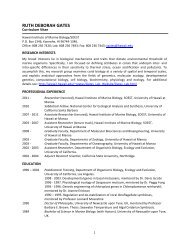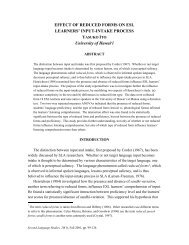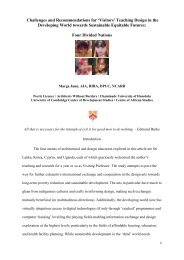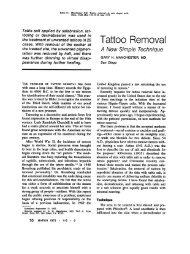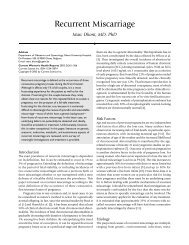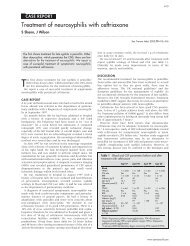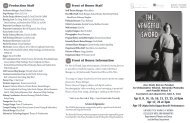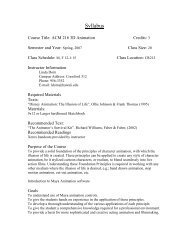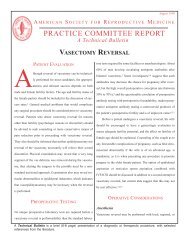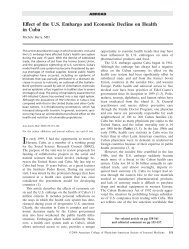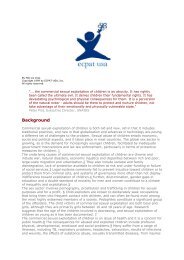Tying and Untying the Trouser-Cord - University of Hawaii
Tying and Untying the Trouser-Cord - University of Hawaii
Tying and Untying the Trouser-Cord - University of Hawaii
Create successful ePaper yourself
Turn your PDF publications into a flip-book with our unique Google optimized e-Paper software.
The Asia Pacific Journal <strong>of</strong> Anthropology 57<br />
mostly translated as ‘piety’, which implies <strong>the</strong> meaning <strong>of</strong> care, fear <strong>of</strong> God, <strong>and</strong><br />
protecting oneself against <strong>the</strong> forbidden <strong>and</strong> sinful. Hence such proverbs are a direct<br />
manifestation <strong>of</strong> <strong>the</strong> normative concept <strong>of</strong> ‘awra; <strong>the</strong>y contain cultural rules <strong>of</strong><br />
emotion whose application in concrete actions is observable. Depending on <strong>the</strong><br />
specific context <strong>and</strong> speech situation, <strong>the</strong>y are strategically used in everyday<br />
interactions among adults <strong>and</strong> between adults <strong>and</strong> children to refer to correct outer<br />
behaviour. In <strong>the</strong> course <strong>of</strong> fieldwork in Indo-Pakistan, I recorded expressions <strong>and</strong><br />
phrases from <strong>the</strong> moral use <strong>of</strong> language among speakers <strong>of</strong> Urdu, Hindi, Punjabi,<br />
Pashto, Persian, <strong>and</strong> Burushaski. A fur<strong>the</strong>r source were dictionaries <strong>of</strong> local languages.<br />
These idiomatic formulas <strong>and</strong> expressions containing rules, advice, <strong>and</strong> references<br />
constitute ‘practical texts’ in <strong>the</strong> sense <strong>of</strong> Foucault who emphasised <strong>the</strong>ir ‘etho-poetic’<br />
function (Foucault 1986, pp. 20 /1). Generally, such proverbs say that a person<br />
should exercise self-control <strong>and</strong> avoid sin. In Punjabi <strong>the</strong> expression nale da pakka<br />
hona, inUrdunale ka pakka hona (lit. ‘for <strong>the</strong> cord to be tight’), means that a person<br />
should take care <strong>of</strong> his trouser-cord, that is, he should control himself <strong>and</strong> guard his<br />
moral purity. Similarly, in Pakhtun culture, where honour is <strong>of</strong> utmost importance,<br />
we find several sayings like: baga chatha ne spachdal in <strong>the</strong> sense <strong>of</strong> <strong>the</strong> injunction<br />
‘you should not dare to open your trouser-cord in front <strong>of</strong> anyone’. In everyday<br />
speech this saying is used in a modified way in sentences like: hagha da bage na dair<br />
teeng de */‘He does not open his trouser-cord to anyone’, that is ‘he is not a person <strong>of</strong><br />
easy virtue’. A very common Pashto proverb runs: baga de sanbale satha */‘Always<br />
keep hold <strong>of</strong> your trouser-cord in a safe place’, that is ‘it should be properly secured<br />
by knots’. This could have been said, for instance, in former times, by a Pakhtun lady<br />
bidding farewell to her husb<strong>and</strong> when he was about to leave for Hindustan to work<br />
for a long period as a horse-trader or sword-seller. In this way she expressed her trust<br />
(yaqin, bharosa) that her husb<strong>and</strong> would remain faithful (ba-wafa) to her.<br />
Matrimonial fidelity (wafadari) is highly valued in Islam, as, for example, in <strong>the</strong><br />
very popular legend <strong>of</strong> Yusuf <strong>and</strong> Zuleikha (also mentioned in Sura 12 <strong>of</strong> <strong>the</strong><br />
Qur’an), <strong>the</strong> point <strong>of</strong> which is that Yusuf safeguarded his chastity despite <strong>the</strong> repeated<br />
advances <strong>of</strong> <strong>the</strong> enticing Zuleikha, Potiphar’s beautiful wife. The enlightening quality<br />
<strong>of</strong> proverbs became especially apparent to me when I recorded my first saying on <strong>the</strong><br />
trouser-cord in February 1995 in Jodhpur (Rajasthan). It runs in Hindi: ghore ki tang<br />
aur admi ka ling b<strong>and</strong>ha hi chahie (or...b<strong>and</strong>he rahna chahie) meaning ‘<strong>the</strong> penis<br />
(which is guarded by <strong>the</strong> pajama-string) should be as securely fastened as <strong>the</strong> leg <strong>of</strong><br />
<strong>the</strong> horse (by a bridle)’. A well-knotted trouser-cord proves that a person is<br />
disciplined <strong>and</strong> not <strong>of</strong> easy virtue. It has already been shown that this is also <strong>of</strong> crucial<br />
importance for mystics <strong>and</strong> ascetics. The Chishti-Sufi Hamid ud-Din Savali Nagauri<br />
(d. 1274) reportedly reprim<strong>and</strong>ed his pleasure-seeking former companions, who tried<br />
to encourage him to return to a sinful life, saying: ‘Go <strong>and</strong> sit in a corner, for I have<br />
tied up my pyjama-cord so tight that I shall not even open it for <strong>the</strong> houris on <strong>the</strong><br />
morrow <strong>of</strong> <strong>the</strong> Resurrection’ (Currie 1989, p. 57).<br />
Knots generally st<strong>and</strong> for responsibility. Among Punjabis, <strong>the</strong> expression ‘tying <strong>the</strong><br />
knots (around one’s neck)’ means to be bound by responsibilities, as when, for



